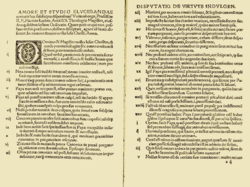
Back Protestantse Hervorming Afrikaans Reformation ALS Reforma protestant AN Cirice Edniwung ANG धर्मसुधार आन्दोलन ANP إصلاح بروتستانتي Arabic تعديل بروتيستانتى ARZ Reforma protestante AST Реформация AV Reformasiya Azerbaijani
| Part of a series on the |
| Reformation |
|---|
 |
| Protestantism |
| Part of a series on |
| Protestantism |
|---|
 |
|
|
| Part of a series on |
| Christianity |
|---|
 |
The Reformation, also known as the Protestant Reformation and the European Reformation,[1] was a major theological movement or period or series of events in Western Christianity in 16th-century Northwestern Europe that posed a religious and political challenge to the papacy and the authority of the Catholic Church. Towards the end of the Renaissance, the Reformation marked the beginning of Protestantism and in turn resulted in a major schism within Western Christianity.[2]
It is considered one of the events that signified the end of the Middle Ages and the beginning of the early modern period in Europe.[3] When the Reformation era ended is disputed among modern scholars.
Prior to Martin Luther and other Protestant Reformers, there were earlier reform movements within Western Christianity. The Protestant Reformation, however, is usually considered to have started on 31 October 1517 with the publication of the Ninety-five Theses, authored by Martin Luther. Over three years later, on 3 January 1521, Luther was excommunicated by Pope Leo X. On 25 May 1521, at the Diet of Worms, Luther was condemned by the Holy Roman Empire, which officially banned citizens from defending or propagating Luther's ideas.[4] Luther survived after being declared an outlaw due to the protection of Elector Frederick the Wise.
The spread of Gutenberg's printing press provided the means for the rapid dissemination of religious materials in the vernacular. The initial movement in Germany diversified, and nearby other reformers such as Huldrych Zwingli and John Calvin with different theologies arose.
In general, the Reformers argued that salvation in Christianity was a completed status based on faith in Jesus alone and not a process that could involve good works, as in the Catholic view. Protestantism also introduced new ecclesiology.
The Counter-Reformation was the Catholic reform efforts initiated in response to the Protestant Reformation and its causes.[5]
- ^ Armstrong, Alstair (2002). European Reformation: 1500–1610 (Heinemann Advanced History): 1500–55. Heinemann Educational. ISBN 0-435-32710-0.
- ^ "Christianity - Schism, Reformation, Doctrine | Britannica". www.britannica.com. Retrieved 26 May 2024.
- ^ Davies 1996, p. 291.
- ^ Fahlbusch, Erwin, and Bromiley, Geoffrey William (2003). The Encyclopedia of Christianity, Volume 3. Grand Rapids, Michigan: Eerdmans. p. 362.
- ^ "Counter Reformation". Encyclopædia Britannica Online. 9 October 2023.